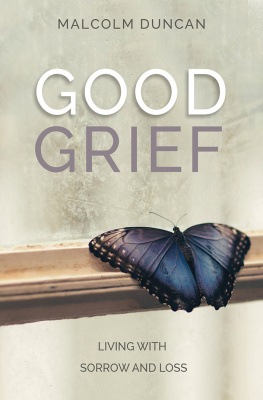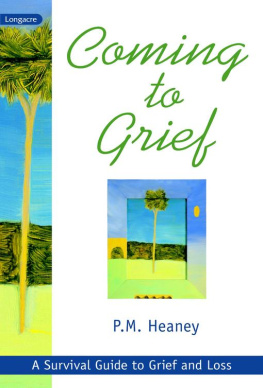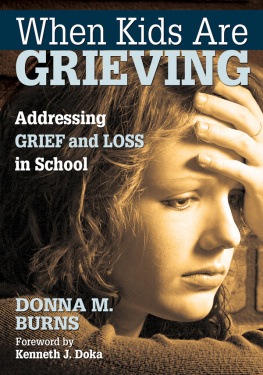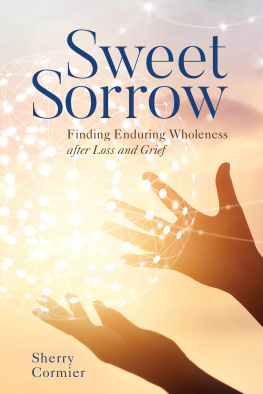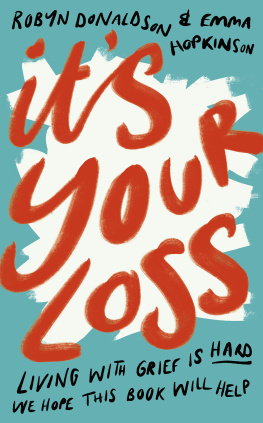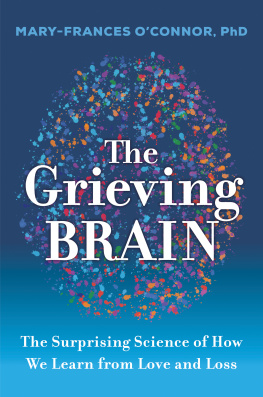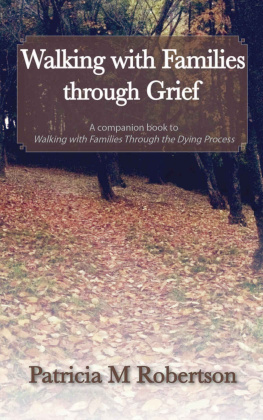Before and After Loss
A Johns Hopkins Press Health Book
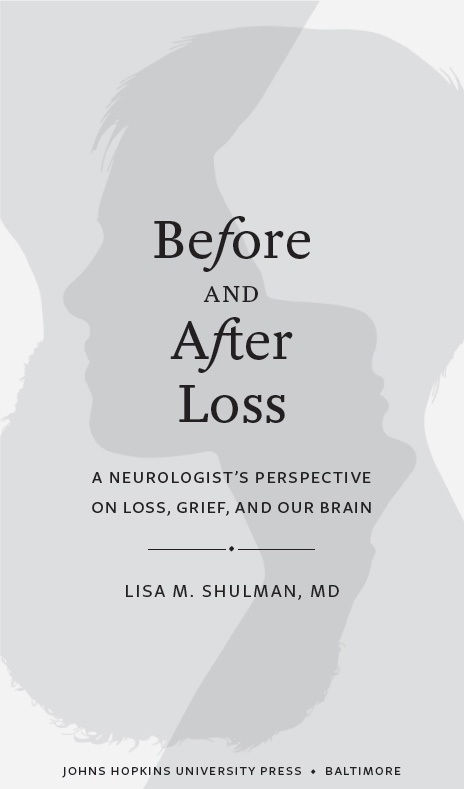
2018 Johns Hopkins University Press
All rights reserved. Published 2018
Printed in the United States of America on acid-free paper
9 8 7 6 5 4 3 2 1
Johns Hopkins University Press
2715 North Charles Street
Baltimore, Maryland 21218-4363
www.press.jhu.edu
Library of Congress Cataloging-in-Publication Data
Names: Shulman, Lisa M., author.
Title: Before and after loss : a neurologists perspective on loss, grief, and our brain / Lisa M. Shulman.
Other titles: Johns Hopkins Press health book.
Description: Baltimore : Johns Hopkins University Press, 2018. | Series: Johns Hopkins Press health book | Includes bibliographical references and index.
Identifiers: LCCN 2018010712| ISBN 9781421426945 (hardcover : alk. paper) | ISBN 1421426943 (hardcover : alk. paper) | ISBN 9781421426952 (paperback : alk. paper) | ISBN 1421426951 (paperback : alk. paper) | ISBN 9781421426969 (electronic) | ISBN 142142696X (electronic)
Subjects: LCSH: Grief. | Bereavement. | Healing. | MESH: Grief | Emotional Adjustment | Attitude to Death | Psychological Traumarehabilitation | Personal Narratives
Classification: LCC BF575.G7 S48 2018 | DDC 155.9/3dc23
LC record available at https://lccn.loc.gov/2018010712
A catalog record for this book is available from the British Library.
Special discounts are available for bulk purchases of this book. For more information, please contact Special Sales at 410-516-6936 or .
Johns Hopkins University Press uses environmentally friendly book materials, including recycled text paper that is composed of at least 30 percent post-consumer waste, whenever possible.
To Bill
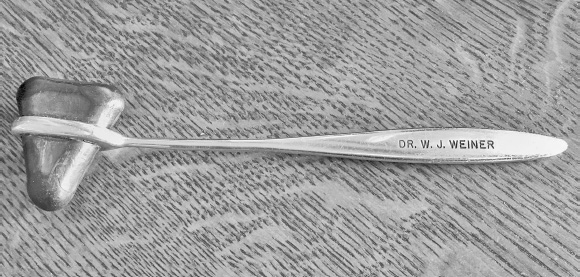
There would be no lobby into this house, and there would be no introduction into it or into the novel. I wanted the reader to be kidnapped, thrown ruthlessly into an alien environment as the first step into a shared experience with the books populationjust as the characters were snatched from one place to another, from any place to any other, without preparation or defense.
Toni Morrison,
Foreword to Beloved
Preface
I expected grief to be unbearable sadness, but it wasnt that at all.
It was profound instability.
Losing bearings, losing identity, losing your coherent self.
Where life is distorted, spooling out in a surreal string of events.
Where sorrow is expected, and altered reality arrives.
AS COMMON AS BIRTH, death is simply part of human experience. Yet we strain to comprehend lifes passagesthe beginning of a new life and the end of another. Addition is easier to grasp than subtraction, the tangible instead of the void. The beginning and end of life are natural, organic. Yet death and grief lie outside the mainstream, veering toward ambiguity and mystery. In these pages, we explore not only the experience but also the science and psychology of grief and loss.
In 2011, my husband and colleague, Dr. William Weiner, was diagnosed with cancer. He died seventeen months later, in December 2012. Bill and I were both neurologiststwo physician-scientists confronting our own health crises. Abruptly, the tables turned as we became patients, rather than physicians. As events unfolded, the space between our previous understanding of our patients experience and our day-to-day reality widened.
This book draws upon our personal experience with grave illness and loss to assist others confronting similar experiences. A neurologist is an expert in brain science and a keen observer of behavior, someone who understands that behavior is a reflection of function of the brain and the mind. In this book, both our professional and personal lives are brought to bear on the challenges we faced. Here, we are both the observer and the observed.
Ive studied coping and adjustment to chronic illness for many years. The disorientation of grief is itself a chronic condition, an altered state where our minds strain to find order in a jumble of unfamiliar events. But knowledge about coping with life wasnt preparation for coping with death. I was ill-prepared for what was to come.
This book explores the interface between the experience of profound loss and the search for emotional restoration and healing. The experience of loss is the setting, but our main focus is the transition from grief to restorationnavigating the transition from grief to a new stage of life.
Grieving is a protective process. Its an evolutionary adaptation to help us survive in the face of emotional trauma. Although we usually envision physical trauma when we think of traumatic brain injury, here well focus on emotional trauma as the cause of brain injury and on its consequences for daily function. The experience of grief can overwhelm us, but understanding the science behind grief can dispel mystery and restore a sense of control. Shedding light on the psychology and science of emotional trauma places our experience in a larger context. Individually, the experience is unfamiliar and surreal, but theres comfort to be found in understanding how our brain responds and heals following traumatic loss. Well review what is known about the effects of loss and grieving on the mind, brain, and body.
Well also explore the self-efficacy of grievingour sense of control during periods of griefand steps we can take to restore confidence and control. Self-efficacy is the confidence we have in our ability to handle challenges and difficult situations. Importantly, self-efficacy improves with better knowledge, insight, and tools to manage our situation. A better sense of control helps us find a path forward. Grief is perilous. It leaves us exposed. Our experiences are personal. Well survey the landscape of loss and healing, but in the end, the answers come from within.
Journaling is a potent tool of healing employed in these pages, with themes framed for personal reflections. From the earliest days of his diagnosis, Bill and I agreed to keep separate journals. We didnt know what was to come, but we recognized the value of our experiencethe reflections of two disease specialists on the disease experience. With Bill gone, I continued writing scattered thoughts and experiences. I became aware of moments when suffering was relieved by transforming waves of emotion into words and coherent sentences. Where emotion was amorphous, words on a page were reassuringly concrete. It was months later that I recognized my healing ritual was simply journaling.
Journaling involves telling your story, being mindful in describing experience. Our stories contain layers of meaning to explore by giving voice to memory and emotion. Seeing the story on the page demystifies traumatic events and lessens the hold these events have on us. As we recall and unravel our experience, insight deepens and bewilderment lessens. We see things with more perspective. We think more clearly. And our interpretation deepens over timedays, months, and years later when we return to read our own words, literally making reflections on reflections.
In the early months of writing, I contemplated turning my journal into a book. As I moved into the second year without Bill, I questioned whether I had anything original to contribute and whether the time had come to look forward, not back. Yet the urge to document memories and insights had its own life. Notes scribbled by day and night piled up around me. And with time the books purpose came into focus. The goal is less memoir, more guidebook, to shed light on common experiences of traumatic loss and how our brain responds and heals. Bills and my experiences are found in these pages, and they are carefully chosen to deepen understanding of the experience of loss and to lay the foundation for approaches to healing.
Next page


